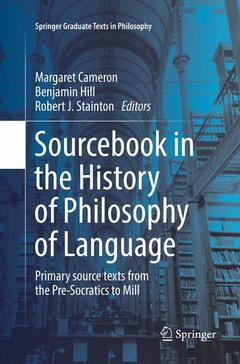Description
Sourcebook in the History of Philosophy of Language, Softcover reprint of the original 1st ed. 2017
Primary source texts from the Pre-Socratics to Mill
Springer Graduate Texts in Philosophy Series, Vol. 2
Coordinators: Cameron Margaret, Hill Benjamin, Stainton Robert J.
Language: English
Subjects for Sourcebook in the History of Philosophy of Language:
Sourcebook in the History of Philosophy of Language
Publication date: 06-2018
Support: Print on demand
Publication date: 06-2018
Support: Print on demand
Sourcebook in the History of Philosophy of Language
Publication date: 09-2016
Support: Print on demand
Publication date: 09-2016
Support: Print on demand
Description
/li>Contents
/li>Biography
/li>Comment
/li>
For the first time in English, this anthology offers a comprehensive selection of primary sources in the history of philosophy of language. Beginning with a detailed introduction contextualizing the subject, the editors draw out recurring themes, including the origin of language, the role of nature and convention in fixing form and meaning, language acquisition, ideal languages, varieties of meanings, language as a tool, and the nexus of language and thought, linking them to representative texts. The handbook moves on to offer seminal contributions from philosophers ranging from the pre-Socratics up to John Stuart Mill, preceding each major historical section with its own introductory assessment. With all of the most relevant primary texts on the philosophy of language included, covering well over two millennia, this judicious, and generous, selection of source material will be an indispensable research tool for historians of philosophy, as well as for philosophers of language,in the twenty-first century. A vital tool for researchers and contemporary philosophers, it will be a touchstone for much further research, with coverage of a long and varied tradition that will benefit today?s scholars and enhance their awareness of earlier contributions to the field. ?
1. Introduction.- 2. Pre-Socratics.- 3. Plato.- 4. Aristotle.- 5. Epicureanism.- 6. Stoics.- 7. Sextus.- 8. Proclus.- 9. Augustine.- 10. Boethius.- 11. Abelard.- 12. Anselm.- 13. Peter of Spain.- 14. Thomas Aquinas.- 15. Roger Bacon.- 16. Modistae.- 17. Peter of Ailly.- 18. William Ockham.- 19. John Buridan.- 20. Lorenzo Valla.- 21. Cajatan.- 22. John of Poinsot.- 23. Montaigne.- 24. Francis Bacon.- 25. Thomas Hobbes.- 26. Arnauld.- 27.Cordemoy.- 28. Locke.- 29. Berkeley.- 30. John Wilkins.- 31. Leibniz.- 32. Condiliac.- 33. Reid.- 34. Adam Smith.- 35. Diderot.- 36. Rousseau.- 37. Herder.- 38. Johann Hamann.- 39. Von Humbolt.- 40. Bolzano.- 41. J.S. Mill.-
Margaret Cameron:
Margaret Cameron is Associate Professor and Canada Research Chair in the Aristotelian Tradition at the University of Victoria. She completed her PhD at the University of Toronto’s Collaborative Program in Ancient and Medieval Philosophy in 2004. She has published on the history of the philosophy of language in the ancient and medieval traditions in various venues, including The Oxford Handbook to Medieval Philosophy (Oxford, 2013) and Linguistic Content (Oxford, 2015). She is editor of a number of volumes, including Philosophy of Mind in the Early and High Middle Ages (Routledge, forthcoming).
Benjamin Hill:
Benjamin Hill is an Associate Professor of Philosophy at The University of Western Ontario. He earned his PhD at the University of Iowa in 2003. He focuses on sixteenth- and seventeenth-century philosophy and is most interested in contrasting the continuities and discontinuities in philosophical thought, especially epistemological thinking, from Francisco Suarez through John Locke and on to George Berkeley. He is editor (with Henrik Lagerlund) of The Philosophy of Francisco Suarez (Oxford, 2012) and Routledge Companion to Sixteenth Century Philosophy (Routledge, 2015).
Robert Stainton:
Robert Stainton was introduced to both philosophy and linguistics at Glendon College of York University, and continued to study in these areas at MIT, where he completed his Ph.D. in 1993. He was Canada Research Chair in Cognitive Science at Carleton University before taking up his current position at the University of Western Ontario, where he is presently Distinguished University Professor of Philosophy and Director of the Graduate Program in Linguistics. He is the editor or co-editor of many books, including Concise Encyclopedia of Philosophy of Language and Linguistics (Elsevier, 2010) and Contemporary Debates in Cognitive Science (Blackwell, 2006).First overview in English of the grammatical and philosophical discussions of language in the Western tradition Contains all relevant primary texts on philosophy of language from antiquity (500BC) to modernity (mid-19th century) Includes a detailed Introduction describing recurring themes and linking these to relevant texts Indispensible research tool for historians of philosophy and contemporary philosophers of language alike?
© 2024 LAVOISIER S.A.S.
These books may interest you

Nietzsche as German Philosopher 102.80 €



